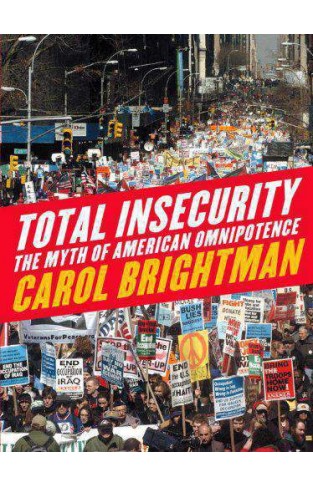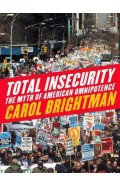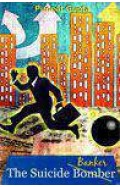- Home
- Books
- Book Bazaar Upto 80% Off
- RP - Business & Management
- Total Insecurity: The Myth of American Omnipotence
Total Insecurity: The Myth of American Omnipotence
By: Carol Brightman
-
Rs 505.80
- Rs 1,124.00
- 55%
You save Rs 618.20.
Due to constant currency fluctuation, prices are subject to change with or without notice.
We're offering a high
discount on this book as it is slightly damaged
Spurred on by the oil barons, the corporate politicians in Washington have set out to play the game of empire alone. One of their first targets is the oil-rich Republic of Iraq. As a brotherhood of investors - including corporations with close ties to George W. Bush, Dick Cheney, and James Baker - attempt to turn war-ravaged Iraq into a cash cow, America's unilateral leadership is becoming increasingly problematic. The adventure has provoked a revival of mass dissent in Europe and the Americas and a ferocious resistance inside Iraq. This test-case war to establish total US hegemony over a region of strategic importance to the United States is descending into chaos and violence. Carol Brightman traces the contours of the latest imperial escapade, contrasting its twists and turns to those of earlier administrations, both Democratic and Republican. She argues that the mix of unchecked power, corporate corruption, and political vulnerability at the top is the most pronounced feature of the Bush regime. She shows how America's obsession with security following September 11, 2001, has prompted a permanent state of war and a permanent war economy, which has been a long time in formation by conservative strategists. She warns of the rise of Iraqi nationalism that US actions have brought about. And she analyses the US abandonment of international treaties and security arrangements as more countries - including Iraq in 2000 - have switched or threaten to switch from dollars to euros for oil trading. Total Insecurity is a call to arms to the new generation to stand up to this Trojan Horse called the War on Terrorism. In a set of moving personal and historical reflections, Carol Brightman revisits the dissent of the 1960s and '70s and compares it to the protests of today. Incisive, erudite and fiercely critical, Brightman suggests that it will take more than regime change in Washington to dispel the myths and illusions about unilateral American power. "This is a story about how the United Nations lost its way. A powerful nation, though not wise, its military forces stood alone in the world. No one attempted to challenge it - certainly not its peers in Europe, or in Russia and China, who had more to gain from economic cooperation and competition than from combat. Besides, the US had become the world's supercop, and global security was generally left to its armed forces and its arms sales. Only Vietnam stood up to America, and that was a long time ago...After a ten-year war, and over 58,000 American deaths, the US was defeated. It was chased out of Saigon, literally, over a week in April 1975, and never looked back. Or it tried to look back, and it didn't learn the first lesson - which is never to wage a war against a people." - Carol Brightman
| Book | |
| What's in the Box? | 1 x Total Insecurity: The Myth of American Omnipotence |
We're offering a high
discount on this book as it is slightly damaged
Spurred on by the oil barons, the corporate politicians in Washington have set out to play the game of empire alone. One of their first targets is the oil-rich Republic of Iraq. As a brotherhood of investors - including corporations with close ties to George W. Bush, Dick Cheney, and James Baker - attempt to turn war-ravaged Iraq into a cash cow, America's unilateral leadership is becoming increasingly problematic. The adventure has provoked a revival of mass dissent in Europe and the Americas and a ferocious resistance inside Iraq. This test-case war to establish total US hegemony over a region of strategic importance to the United States is descending into chaos and violence. Carol Brightman traces the contours of the latest imperial escapade, contrasting its twists and turns to those of earlier administrations, both Democratic and Republican. She argues that the mix of unchecked power, corporate corruption, and political vulnerability at the top is the most pronounced feature of the Bush regime. She shows how America's obsession with security following September 11, 2001, has prompted a permanent state of war and a permanent war economy, which has been a long time in formation by conservative strategists. She warns of the rise of Iraqi nationalism that US actions have brought about. And she analyses the US abandonment of international treaties and security arrangements as more countries - including Iraq in 2000 - have switched or threaten to switch from dollars to euros for oil trading. Total Insecurity is a call to arms to the new generation to stand up to this Trojan Horse called the War on Terrorism. In a set of moving personal and historical reflections, Carol Brightman revisits the dissent of the 1960s and '70s and compares it to the protests of today. Incisive, erudite and fiercely critical, Brightman suggests that it will take more than regime change in Washington to dispel the myths and illusions about unilateral American power. "This is a story about how the United Nations lost its way. A powerful nation, though not wise, its military forces stood alone in the world. No one attempted to challenge it - certainly not its peers in Europe, or in Russia and China, who had more to gain from economic cooperation and competition than from combat. Besides, the US had become the world's supercop, and global security was generally left to its armed forces and its arms sales. Only Vietnam stood up to America, and that was a long time ago...After a ten-year war, and over 58,000 American deaths, the US was defeated. It was chased out of Saigon, literally, over a week in April 1975, and never looked back. Or it tried to look back, and it didn't learn the first lesson - which is never to wage a war against a people." - Carol Brightman
Total Insecurity: The Myth of American Omnipotence
By: Carol Brightman
Rs 505.80 Rs 1,124.00 Ex Tax :Rs 505.80
Zubin Mehta: A Musical Journey (An Authorized Biography)
By: VOID - Bakhtiar K. Dadabhoy
Rs 472.50 Rs 1,050.00 Ex Tax :Rs 472.50
Manning Up: How the Rise of Women Has Turned Men into Boys
By: Kay Hymowitz
Rs 646.75 Rs 995.00 Ex Tax :Rs 646.75
No similar books from this author available at the moment.
No recently viewed books available at the moment.
Zubin Mehta: A Musical Journey (An Authorized Biography)
By: VOID - Bakhtiar K. Dadabhoy
Rs 472.50 Rs 1,050.00 Ex Tax :Rs 472.50
Total Insecurity: The Myth of American Omnipotence
By: Carol Brightman
Rs 505.80 Rs 1,124.00 Ex Tax :Rs 505.80













-120x187.jpg?q6)













